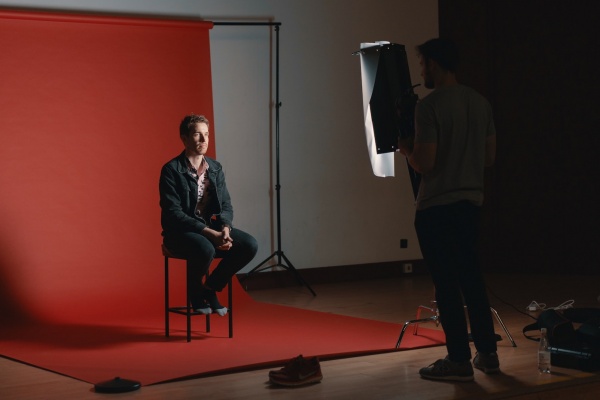
How Do I Prepare for Recorded Video Admissions Interviews/Essays?
Summary: Zoom and Skype-based interviews have become even more utilized in the admissions world for top programs like KELLOGG, INSEAD, ROTMAN, YALE and MIT. At the same time, the Recorded Video Interview or Essay has also enabled admissions committees and staff to see more of the human side of applicants early in the process.
Assessing an applicant’s capabilities, experience and potential has traditionally been relegated mostly to test scores, transcripts, written essays, CV, recommendation letters and the application form where it is all assembled.
While the interview – the last piece of the puzzle – is considered a way to humanize the applicant and bring life to the static and faceless assembly.
The person-to-person interview – conducted by alumni or admissions officers and staff - continues to be the gold standard. When its not possible to conduct the interview in person, video conferencing platforms like Zoom or Skype have lately become even more important.
Regardless of whether it is in-person or video conference, the formal person-to-person interview is essentially a judgement of the candidate. Most often there is a numeric score and qualitative comments interviewers must deliver to the admissions committee following the applicant interview.
Globally selective institutions like KELLOGG, INSEAD, ROTMAN, YALE or MIT also use Recorded Video Interviews (also called Video Essays), which augment the process but do not replace in-person interviews.
Recorded Interviews can still be judged on quantitative and/or qualitative basis but many of the admissions departments utilizing them insist they are not looking to eliminate candidates based on perfect, highly edited videos, rather they emphasize authenticity and getting understand candidates better.
It is important to remember, that similar to written essay questions, the Recorded Video questions will often directly or indirectly measure a candidate’s familiarity with the institution, program and other elements like the culture they seek to recruit and promote.
So, for example, as INSEAD aggressively markets itself as The Business School for the World, its highly probable the video interview contains questions related to a candidate’s international experience or perspective. Or consider Rotman, which seeks to introduce the idea of a “spike” factor in its MBA, which is defined as those who “stand out by doing interesting things with their personal and professional lives.”
Is there a difference between Video Essay and Video Interview?
Actually, there’s no real content difference: a candidate is explaining their self in a recorded video. Given this is a relatively newer part of the application process, some schools like Rotman and Insead refer to a Video Interview, while Kellogg and MIT refer to a Video Essay. Finally, Yale refers to them as Video Questions. All of these formats ask for information, the particulars of what those questions may be and when and how they are delivered is the chief difference.
Where does the KELLOGG MBA Application use Recorded Video Essays?
Directly upon submission and payment of the application, Kellogg delivers a video link immediately to applicants. Applicants are required to complete the Essay within 48 hours of the application deadline. According to Kellogg, the Recorded Video Essays are viewed following a review of all application materials.
What questions are in the KELLOGG MBA Recorded Video Interview?
There are three questions randomized from a longer list. This list can be updated with new questions, so, it is impossible to know exactly what you will receive. Applicants are given 20 seconds to think about the question and 60 seconds to answer.
It’s important to know, the questions correspond to this format:
First: A question allowing you to introduce yourself to the Kellogg Admissions team.
Second: A question on what your future plans are and how Kellogg will help you on that journey.
Third: A question leading you to focus on a challenging moment and what you learned from it.
Questions used for Kellog’s video interview in the past
• What possession or memento do you treasure most and why?
• If you had an extra hour every day, what would you do with it?
• What piece of technology could you not live without and why?
• What word describes you best and why?
• Tell us about the first job you ever had?
• What’s the best book you have ever read and why?
• When you have a problem, whom do you approach for advice and why?
• What accomplishment are you really proud of?
• What’s the best piece of advice you have ever received?
• If you could witness any event..past present or future-what would it be?
• What one interesting / fun fact would you want your future Kellogg classmates to know about you?
• If you could teach a class on any topic. What would it be and why?
• If you were given a chance to meet anyone, current or historical, who would you meet and why?
• What was the most interesting class you took at University?
• Tell us about an organization or activity in which you have dedicated significant time. Why was it meaningful to you?
• Tell us about something good someone else did for you and how you felt about it?
• Tell us about the most interesting place you’ve traveled to. What did you enjoy most about it.
• Talk about a team disagreement and how you handled it.
• What invention during your lifetime has had the biggest impact on you and why?
• If money was not a concern. what would you do?
• Why did you choose your college major?
• What is the most meaningful thing anyone has done for you in your life? X 2
• If you could live anywhere in the world, where would it be and why?
• What food do you like? Will you be able to eat that food everyday?
• How do you define success?
• How have you changed in the last 5 years?
• Whom do you respect most, and why?
• What is your favorite motto or quote, and why?
• Describe a leadership style you admire?
• What risk have you taken and what did you learn?
• What impact do you have on your co-workers?
• What inspires you?
• What are you most passionate about?
• What is your favorite song/artist/album?
• What superpower you’d want and why?
Where does the INSEAD MBA Application Use a Recorded Video Interview?
INSEAD automatically asks applicants who complete an online application to the MBA program to conduct a video interview at their earliest convenience or at least 48 hours after the deadline to which they are applying.
Reportedly, the video allowed INSEAD to drop one of its written essays from the application, which today contains three required essay questions and an optional fourth.
This video interview – which is reviewed by the admissions staff – is part of the first pass assessment conducted before validating the next phase of the In-Person interview with two INSEAD Alumni.
What questions are in the INSEAD MBA Application Recorded Video Interview?
There are 4 different randomized interview questions which ask a candidate to review the question and prepare an answer over 45 seconds and then deliver the answer in a 60-second recorded video.
In INSEAD’s own words: “The video should be seen as a unique opportunity for you to share your passions, your motivations and who you truly are. The MBA Admissions Committee is interested in obtaining an authentic view of you as a person, to see how you think on your feet and how you convey your ideas.”
Keep in mind, however, while the Admissions Committee watches the interview for an “authentic view” of an applicant, they are also considering soft skills, such as communication and as INSEAD contains a majority of non-Native English-speakers, even on more technical level there is an assessment of your ability to communicate correctly in English.
Examples of previous INSEAD interview questions:
- Explain what you would do to gain respect as a new manager.
- Describe a time when understanding someone else’s perspective helped you understand him/her better.
- Please describe a situation in which you worked will people from different background and how did you adapted.
- Please describe a situation in which you worked with someone who had different opinions than yours.
- Encounter with different people (diversity question) and how did it effect you.
- Give examples of how you stay focused on your vision or the vision of your company?
- What do you know about the INSEAD MBA program?
- What do you think are the key elements for starting and running a successful business?
- What do you believe to be the 3 top values of a business/company?
- Tell us about a time when listening to another person helped changes my perspective.
- How would you approach a team member that is not putting his share of work towards the goal?
- What are the 3 factors that you would like to incorporate in your company?
- How would INSEAD help you to achieve your career goals?
- What will consider a success if you were to attend INSEAD?
- what are the 3 main things an entrepreneur needs in order to be successful.
- What makes you can good candidate for the INSEAD MBA program?
- Tell us about an experience where you were significantly impacted by cultural diversity, in a positive or negative way.
- What do you think of the sentence “in Rome, act like a Roman” and why?
- Tell us about an international encounter you had. what did you learn from it?
- Tell me about an experience living, travelling, studying or working abroad. What was this experience like for you?
- Do you think that companies should consider factors other than maximizing value?
- Tell us about a manager you looked up to – what were the qualities you liked?
- A colleague is asking you to help him/her to assess his/her future career options. How do you help him/her grow?
- How would you define success for your career?
- If you were a team leader an you had a worker who is constantly under-delivers – what would you do?
- Please explain why and how networking will help you in a start-up situation?
- What are the 3 main reasons you chose INSEAD?
- If you had unlimited resources and funds – what company will you create?
Where does the Rotman MBA Application use a Recorded Video Interview?
Following submission of the online application, the applicant receives a link to the Recorded Video Interview.
What questions are in the Rotman MBA Recorded Video Interview:
Since 2012, Rotman’s website has referred applicants looking for information on the “Video Interview” to a blog post about “Innovation in the application” written by a now former admissions director detailing “a media-rich version of a ‘live’ essay question”.
There are two questions. Googling for the specific questions will give you a flood of “possible questions” but its impossible to know specifically what they are. Sufficed to say these two questions will be looking to learn about your “personality, interests, passions, and talents.”
It’s worth noting, Rotman also asks for a separate, additional timed written essay response, which consists of 10-minute deadline.
Examples of Rotman’s interview questions from the past
- What would you like to tell your future classmates?
- Tell about an activity you enjoy.
- What was the the greatest advice your first boss gave you?
- What was the biggest risk you’ve taken so far?
- How would your co-workers describe you?
- Identify an influential figure in your lives, and why
- What do you do for fun?
- What are your passions, interests, and hobbies?
- If you could travel across the United States in a car with anyone, whom would you choose to travel with and why?
- What would you do on a rainy Sunday afternoon?
- How have you handled a difficult interaction? What did you learn from it?
- Describe a difficult professional decision you had to make. What were the consequences, and what, if anything, did you learn?
- How do you celebrate success?
- What trait is the most important to you? Why?
- Why MBA?
- Why you?
- What did you do in the past week that was brave?
- What drives you in your personal life?
- If you had to perform in a talent show, what would you choose to act?
What is in Yale & MIT Sloan’s Recorded Video Interview:
MIT Sloan simply asks for an unedited, single take minute-long self-introduction.
While Yale asks three randomized questions: two separate questions with 20 seconds each to “gather your thoughts” and 60 seconds each to respond and subsequently a third and final question which allows for a 30-second preparation for a maximum 90-second response.
While MIT is evaluating applicants through the lens of a video introduction which replaces written introductory essay, YALE’s video is also more or less replacing a general introduction question given that it’s one and only essay question simply asks : “Describe the biggest commitment you have ever made.”
What to expect in a Recorded video interview:
As the examples of INSEAD, YALE and MIT Sloan show, the video interview is not primarily offered to weed out candidates.
Although, it is certainly feasible a candidate could crack under self-induced pressure or deliver a recorded response that is unintelligible, rambling or in terrible English.
That kind of response would directly reduce an admissions committee’s desire to further the candidate towards the more important and final stage of In-Person Interview.
Instead of thinking of this possibility, it’s better to think of the video as an opportunity for the admissions committee to know the candidate better.
Possible questions for Yale’s video interview
• Where do you want to travel in the world and why?
• Explain your hobbies
• What is the biggest challenge facing leaders today?
• What are your personal steps to conflict resolution?
• Do you think technology divides or unites us?
• How do you define success.
• Most significant accomplishment
• Time when you face resistant
• “leaders do not search consensus but molder of consensus”
• Describe a leadership style you admire
• What qualities would your friends use to describe you.
• How would your friend and coworkers describe you?
• Please respond to the following statement: “Without Arts, an education can not be accomplished” Do you agree or disagree? why?
• Do you think the people who raise capital in an organization are the most important part? Why/why not?
• What would you say are your strengths and weaknesses.
• Please respond to the following statement: “As businesses become more global, the differences between cultures decrease.” Do you agree or disagree? Why?
• Tell us about a challenging work experience and how you handled it.
• Tell us about how you engaged with a community or an Organization.
• Tell us about your leadership style.
• How did you contribute to your company/organization?
• Talk about a team disagreement and how you handled it.
• Please respond to the following statement: “Imagination is more important than knowledge. For knowledge is limited to all we now know and understand, while imagination embraces the entire world, and all there ever will be to know and understand.” Do you agree or disagree? why?
• Do you agree or disagree with the notion that chief executive’s first priority should be a profit for shareholders?
• What accomplishment are you most proud of?
• Tell us about a difficult decision and how you handled it?
• Tell us about a creative solution you designed
• Tell us about a shortcut you and a team could have taken, but decided not to
• If we asked your colleagues about your weakness and strengths, what would they say ?
• How will you resolve a conflict with your future classmates at the program?
• Why is now the time for you to pursue an MBA? / Why have you chosen to do your MBA now?
• Tell us about a time when you fell behind on a task/deadline. Why did you fall behind, and what steps did you take to catch up?
• “The People who we remember most are the people who break the rules.” Do you agree or disagree with this statement?
• Tell us about a time when you had to exert extra effort to complete a task. What was that task and what steps did you take to be successful?
What to expect in a Recorded video interview:
As the examples of INSEAD, YALE and MIT Sloan show, the video interview is not primarily offered to weed out candidates.
Although, it is certainly feasible a candidate could crack under self-induced pressure or deliver a recorded response that is unintelligible, rambling or in terrible English.
That kind of response would directly reduce an admissions committee’s desire to further the candidate towards the more important and final stage of In-Person Interview.
Instead of thinking of this possibility, it’s better to think of the video as an opportunity for the admissions committee to know the candidate better.
Based on this perspective you can follow this advice:
1. Keep your cool and don’t overstress: It’s obviously more difficult for an admission committee to get to know candidates who freeze or stutter under stress. Preparation can help you to limit the stress from expectation of the uncertain. So, make sure you have the right clothing (business formal) and right setting of a comfortable, uninterrupted environment.
2. No technical breakdowns, use good equipment: Make sure your equipment is thoroughly reliable, tested, updated and ready. Most importantly, the Recorded Interview is trying to assess you personally. So, making sure your microphone and camera can produce the best, most clear image and sound is a top priority. Perhaps more than stuttering or incomplete answers, a smudged camera lens and a booming mic that picks up heavy-breathing and scratches your face are absolutely your worst enemy.
3. Master the Self-Introduction: This will be your first opportunity to unveil your smooth, concise 60-secords or less sales pitch for yourself. You should have it written out and rehearsed to the point that you can even seem to improvise areas if needed.
4.Practice: This goes for all interviews. But, knowing the precise duration of question and response allows you to prepare for a variety of questions. By literally conducting the interview in a mock sense. Get creative and think of questions you would like to answer or questions you would like to ask.
5. Know the school’s culture: As mentioned earlier, schools generally want to promote a culture. Video Interviews can be a way to see how you might fit into that culture. So, speak to the school, alumni and stakeholders to best understand this culture and you will be more prepared to answer questions based in that culture.
Deadlines:
Lastly, as the video interview is most often the final piece of the application process (in most cases it can be delivered up to 48 hours after the published deadline) it’s a good point to remind everyone of the oldest and most important advice when it comes to applications: Apply Early!
Waiting 47 hours after the final deadline is not the best time to put that last piece of the puzzle into your application. This is because at the beginning of the application season, there are two things – fewer admitted applicants, more scholarship money.
Ready to get started?
Contact us for your a personalised analysis of your situation by our top coach who has more than 10 years of experience admissions experence




